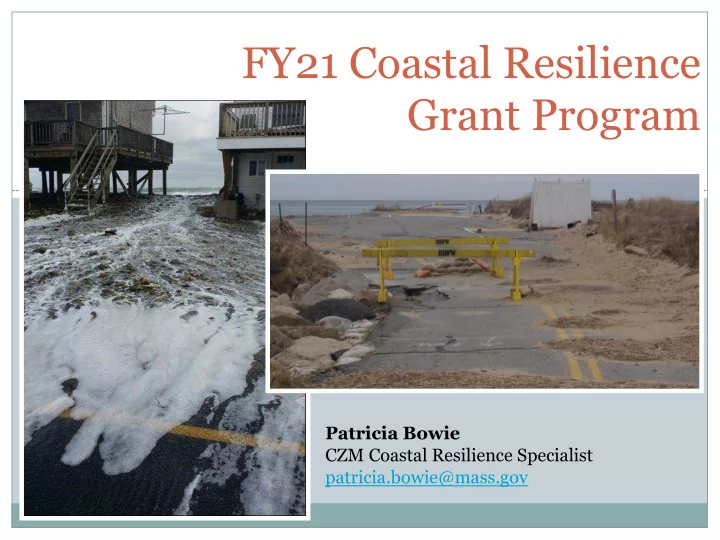

FY21 Coastal Resilience Grant Program Patricia Bowie CZM Coastal Resilience Specialist patricia.bowie@mass.gov
Support for Local and Regional Adaptation State Funding ($M) Proposals Fiscal Year Requested Awarded Received Awarded FY14 $4.8 $2.0 32 19 FY15 $5.2 $2.7 27 17 FY16 $3.0 $2.2 22 16 FY17 $5.0 $1.8 36 18 FY18 $5.6 $2.3 34 16 FY19 $5.4 $3.2 31 19 FY20 $3.3 $2.4 26 21 ~ $32 ~ $17 Total 208 126 FY21: CZM anticipates similar funding levels as previous years, with applicants able to request up to $1 million
Anticipated FY21 RFR Timeline Milestone Tentative Timeline RFR released on CommBuys April 2020 Q & A: Submit questions in writing; Q & A posted online + 2 weeks Electronic applications due: coastal.resilience@mass.gov Mid-June Award announcement August Project scoping and contract execution August – Sept. Project start: Date of EEA’s signature on your contract September June 30, 2021 Project end (FY21)
Eligibility Project Types: Applicants: 1. Detailed Vulnerability and Risk 78 coastal cities and towns Assessment - All project types #1-5 *Municipalities must be MVP certified - Local or multi-community (regional) projects 2. Public Education and Communication Nonprofits that own vulnerable coastal property that is open and 3. Proactive Planning accessible to the public - Project Types #2, 3, and 5 4. Redesigns and Retrofits 5. Shoreline Restoration
1. Detailed Risk and Vulnerability Assessments Evaluate vulnerable public facilities and infrastructure Utilize best available climate projections (e.g. sea level rise and precipitation) Project Examples: ¡ Targeted vulnerability assessment of low-lying roadways ¡ Wastewater infrastructure vulnerability assessment to coastal flooding and climate change ¡ Detailed assessments and public engagement for harbor and adjacent waterfront areas
2. Public Education and Communication Increase public understanding and awareness of coastal storm and climate impacts Build effective partnerships to develop support for implementation of proactive measures Project Examples: ¡ Creative communication products (e.g. podcasts, story maps, drone videos, stakeholder interviews) ¡ Reach broader audiences through local and regional partnerships
3. Proactive Planning Reduce exposure of vulnerable facilities and infrastructure through proactive planning and resilient land-use management Project Examples: ¡ Assess coastal processes as a basis for identifying and prioritizing management strategies along sections of the shoreline ¡ Partnering with adjacent communities to develop a comprehensive shoreline management framework
4. Redesigns and Retrofits Engineering and construction projects to redesign and retrofit vulnerable municipally-owned facilities and infrastructure to withstand flooding and erosion over the design life Project Examples: ¡ Identifying and prioritizing flood proofing needs at vulnerable pump stations ¡ Redesigning revetments and seawalls to minimize wave overtopping and account for future sea level rise projections
5. Shoreline Restoration Evaluate suitability, design, permit and construct and/or monitor non-structural approaches that restore or enhance natural buffers, including: ¡ Beach, berm and dune building ¡ Bioengineering for coastal bank stabilization ¡ Restoration or enhancement of fringing salt marshes ¡ Living “breakwater” construction
Recently constructed: Salem - Collins Cove ¡ FY15 Feasibility Assessment ($75,000) ¡ FY17 Preliminary Design ($54,665) ¡ FY18 Permitting & Final Design ($55,230) ¡ FY19 Restoration ($216,550) Story Map Winthrop - Coughlin Park Duxbury Beach Reservation - Dune enhancement Top: Collins Cove during king tide Mattapoisett - Water main Bottom: Volunteers planting salt crossing relocation marsh vegetation
Evaluation Criteria Current vulnerability and management approach Climate impact and future vulnerability Need for assistance Detailed project description * Public benefit and interests Transferability Timeline * Budget * (Local match of 25% of total project cost preferred ) Project management and partners Overall project quality * Break down by task and fiscal year
Application Tips Be realistic about schedule and tasks. Phase complex projects over time: ¡ Planning, feasibility assessment, and siting ¡ Design ¡ Permitting ¡ Construction, installation, and/or monitoring Consider time to secure sub-contractors Document rationale for preferred project approach ¡ Articulate how the project approach addresses known coastal storm or climate impacts ¡ Describe how project builds on previous projects/phases and fits into comprehensive, long term plans ¡ Assume reviewers do not have project background Consider monitoring and maintenance needs beyond grant
Resources CZM StormSmart Coasts Program www.mass.gov/stormsmart-coasts-program ¡ Coastal Resilience Grant Program ¡ Grant Viewer ¡ MA Sea Level Rise and Coastal Flooding Viewer ¡ StormSmart Property Factsheets MA Climate Change Clearinghouse www.resilientma.org ¡ Downscaled climate change projections MA MyCoast www.mycoast.org/ma ¡ Reports and photos of storm impacts
Contact Information Patricia Bowie Jason Burtner South Shore Regional Coordinator Coastal Resiliency Specialist Phone: (617) 626-1186 Phone: (781) 546-6012 patricia.bowie@mass.gov jason.burtner@mass.gov Kathryn Glenn Stephen McKenna North Shore Regional Coordinator Cape Cod & Islands Regional Coordinator Phone: (508) 375-6856 Phone: (978) 281-3972 kathryn.glenn@mass.gov stephen.mckenna@mass.gov Erikk Hokenson David Janik Boston Harbor Regional Coordinator South Coastal Regional Coordinator Phone: (617) 626-1234 Phone: (774) 377-6001 erikk.hokenson@mass.gov david.janik@mass.gov (Email preferred)
Recommend
More recommend